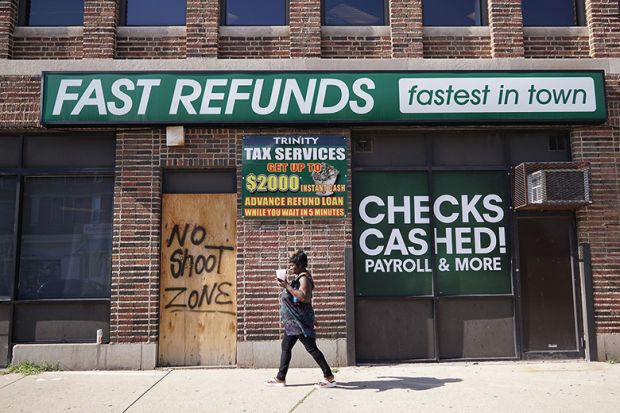Multiple US college towns are putting new waves of pressure on their local universities to make municipal payments to offset their tax-exempt status, although most are falling short of their goals.
Such fights are frequent in the north-eastern part of the US, which has both a relatively large number of institutions and a heavy reliance on property tax revenue.
Yet the effort that has attracted most attention recently is on the country’s west coast, where local residents upset by costs imposed on their community won a legal victory forcing the University of California, Berkeley to sharply reduce its on-campus enrolments this coming autumn semester. The ruling was later overturned by California lawmakers.
Receiving less national attention have been showdowns over unmet municipal costs involving Johns Hopkins University and the city of Baltimore, the University of Pennsylvania and the city of Philadelphia, and various institutions in and around Boston.
“There is a growing movement of communities to take action to gain benefits from major institutions,” said Enid Eckstein, a political activist and former union official leading the effort across the state of Massachusetts.
All US states exempt non-profit organisations – typically involving education, healthcare and religion – from paying property taxes. Because of the importance of property taxes to local governments, the effects fall heaviest on a relatively small number of communities. Higher education often generates a disproportionate share of local resentment as it serves a growing share of students from outside the region.
Pressure campaigns have had some success, but most tend to hit the reality that payments in lieu of taxes, abbreviated as “Pilot”, are largely voluntary and typically well below the amounts that would be paid by a for-profit operation of similar size.
Non-profit classifications cost local governments about 4 per cent to 8 per cent of their tax revenues, according to a study by the Lincoln Institute of Land Policy, although there are wide variations. Almost half of all land in the city of Boston is tax-exempt because of the plethora of governmental and non-profit owners, according to Ms Eckstein’s organisation, the Massachusetts Pilot Action Group.
Negotiations over the matter often take the form of universities making some amount of Pilot payment while arguing that they provide other financial and non-financial benefits to local residents, secure in the knowledge that critics have few legal options to force changes.
In Berkeley’s case, the local residents have made progress by arguing to a court that overcrowding of the community due to increased university enrolment violates state environmental regulations. In Massachusetts, activists are asking state lawmakers to pass a bill that would give local communities power to compel some level of regular Pilot payment.
The city of Boston has a model for Pilot that asks large institutions to pay the city an amount equal to a quarter of the tax bill their real estate assets would incur if not exempt, and as little as half of that much if they can show “tangible community benefits” of equal value, said Andrew Mikula, a master’s student in urban planning at Harvard University who co-authored a report on Pilot funding last year for the Pioneer Institute thinktank.
Local activists, however, have complained that a series of leading universities – including Harvard, Tufts and Northeastern universities – have not met even those levels.
The goal, Ms Eckstein said, is to “make sure the institutions pay their fair share”.
Register to continue
Why register?
- Registration is free and only takes a moment
- Once registered, you can read 3 articles a month
- Sign up for our newsletter
Subscribe
Or subscribe for unlimited access to:
- Unlimited access to news, views, insights & reviews
- Digital editions
- Digital access to THE’s university and college rankings analysis
Already registered or a current subscriber? Login









